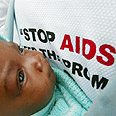
The program, developed by Israel Prize-winning Prof. Pnina Klein, Director of Bar-Ilan University's Edward I. and Fannie Baker Center for the Study of Development Disorders in Infants and Young Children, is based on a study funded by the National Institute of Health, conducted in Uganda, where about one million children have lost at least one parent to AIDS.
The goal of the research, headed by Prof. Michael Boivin, of Michigan State University, was to determine whether children whose parents have HIV (AIDS) could benefit from Prof. Klein's Mediational Intervention for Sensitizing Caregivers (MISC) Program, which has helped caregivers in 14 other countries and different circumstances use day-to-day interaction at home to develop children's social skills, language and cognitive ability.
To test the approach the researchers recruited 120 uninfected preschool-aged children whose mothers had HIV. The children's caregivers – their infected mothers, in most cases – were randomly assigned to receive childcare training through MISC or through am education program focused on improving children's health and nutrition.
After a year, the children whose caregivers received the MISC training showed significantly more developmental progress than the others, with particularly strong gains in language learning. They also developed better memory and overall cognitive skills.
Caregivers in both groups also benefited from the training. They showed decreased symptoms of depression and anxiety, which, according to Boivin, could be attributed to the social support provided through the biweekly training sessions.
Love and caring
Prof. Klein's work revolves around two basic concepts which she has defined: "Mental diet" and "literacy of interaction." Mental diet refers to the "ingredients" a child should receive from the adults who interact with him or her and what types of behaviors are necessary in order to prepare a child for future learning. She and her team have designed a method of creating a profile of a child's mental diet in order to develop an intervention program designed to either introduce missing elements or strengthen existing elements in that mental diet.
Literacy of interaction refers to the ability to read, understand and decode interactions between children and adults and decide what needs to be built in order to enhance the interaction and help the child benefit from future experiences in learning. “We need a good mental diet as much as a physical one – one with proteins and minerals," says Prof. Klein.
"We are focusing on the roots of the interaction – smiles, looks, eye to eye contact, mutual engagement and three basic messages: ‘I love you,’ which conveys the message of self-worth, ‘I am with you,’ which conveys security, and a message that ‘It is worthwhile to do.’
"These reinforcements allow a child to feel his or her significance and importance in the world, and can help to regulate behavior. With this information, those running the MISC program can make suggestions to help improve a child’s educational diet and the quality of interactions," says Prof. Klein.
The daughter of Holocaust survivors, Prof. Klein – whose work has been adopted by governments and agencies around the world – was the first baby born after the war into a family that had lost all its children.
"I think my mental diet was composed of a lot of love and caring, which probably enhanced in me the need to express it and do something for others," she says.
Reprinted with permission from Shalom Life















